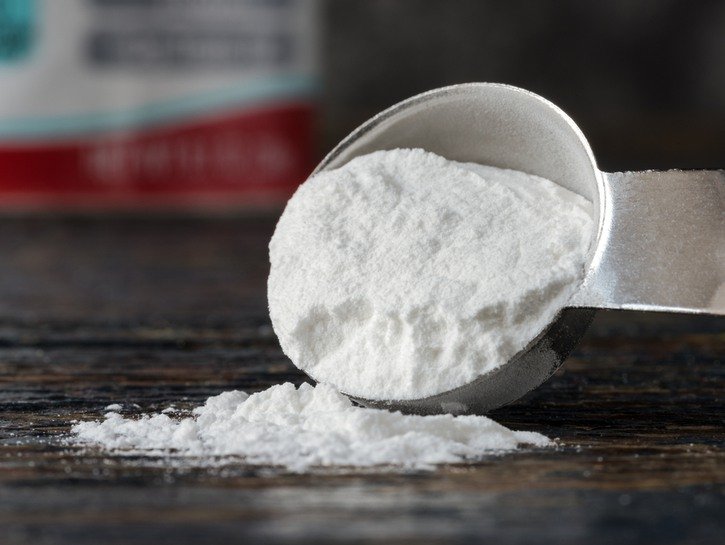What Is Baking Powder?
Baking powder (much like baking soda) is a leavening agent, a mixture of bicarbonate and a weak acid, that releases gasses in doughs and batters, which causes them to expand. This chemical reaction is key to anything that is baked, otherwise, you’re left with something that is hard and flat, the very opposite of everything we want in a cake, cookies, or loaf of bread.

What Happens If You Don’t Have Baking Powder?
Before you even begin the process of making cookies or other baked goods, you should probably check your pantry and make sure that you have all the necessary ingredients, especially baking powder. As we learned earlier in this article, baking powder will make or break any and every baked good, no matter what you’re baking. I mean, who really wants cracker-thin cookies that not even the longest dunk in a cup of milk will cure.
But there will be a time (it’s happened to all of us) where we won’t have baking powder. You can either bug the neighbor you only talk to in times like this and borrow a teaspoon of baking powder, run to the store and pick up a fresh can, or come up with the proper substitute. Well, we have you covered on the third option.
What Are The Most Common Substitutes For Baking Powder?
1. Buttermilk
Buttermilk is a fermented dairy product with a very distinct sour and tangy flavor profile. This effect is created by adding bacteria to milk and allowing it to ferment, which breaks down sugars into acids.
By combining 1/2 a cup of buttermilk with 1/4 teaspoon of baking soda, the chemical reaction mimics the effect of 1 teaspoon of baking powder. Beware, however, as you will need to decrease the liquids in the recipe to adjust for the buttermilk.
2. Plain Yogurt
Plain Yogurt (it has to be plain) is quite similar to buttermilk in the sense that it manufactured through a fermentation process where the sugars are turned into acid.
Like buttermilk, you will need to combine 1/2 a cup of yogurt and 1/4 teaspoon of baking soda. Don’t forget to adjust your other liquids to account for the yogurt.
3. Molasses
Molasses will add an extra kick of sweetness to whatever you cook, so that it’s either a good thing or a bad thing depending on if you are making cakes or breads. When combined with baking soda, molasses will create an acid, which is a good replacement for baking powder with a little something extra for the tastebuds.
To replace one teaspoon of baking powder, simply combine 1/4 cup of molasses and 1/4 teaspoon of baking soda. Simply enough, right?
4. Cream Of Tartar
Cream of Tartar even slightly resembles the look and feel of baking powder, so why not use it as a substitute in a time of need? Replace one teaspoon of baking powder with 1/4 teaspoon of baking soda and 1/2 teaspoon of cream of tartar.
5. Sour Milk
You won’t want to use the spoiled milk in the back of your fridge as a replacement for baking powder, but you can use soured milk. To create soured milk, simply combine 1 tablespoon of vinegar or lemon juice and combine it with enough milk to equal 1 cup. Then let the soured milk stand for at least 5 minutes before using.
This is a good replacement for not only baking powder, but also buttermilk or plain yogurt in a recipe. So you can kill three birds with stone with this one.
6. Vinegar
Who knew vinegar could be used as a replacement for baking soda? Well, it’s not that strange when you think about it. The acidity in the vinegar will help cookies, cakes, and breads rise, but only if you use white vinegar and not apple cider vinegar.
To substitute for baking powder, use 1/4 teaspoon of baking soda mixed with 1/2 teaspoon of white vinegar.
7. Lemon Juice
Lemon juice can be an OK substitute for baking powder, but only if you’re careful or don’t mind a slight lemony taste in your baked goods. Those brave enough can combine 1/4 teaspoon of lemon juice with 1/2 teaspoon of baking soda to replace 1 teaspoon of baking powder.
You have been warned.
8. Self-Rising Flour
Self-rising flour already contains small amounts of baking powder and baking soda, so why not take care of three problems at once and just replace both ingredients, as well as regular flour, with one package. It will help your cakes, cookies, and other baked goods rise with little to no effort, and you only have to measure once.
If you go this route, however, make sure to factor in the proper measurements. It’s best not to guess in the baking game.

A Slight Adjustment Can Make All The Difference
I cannot stress this enough… even the slightest adjustment can drastically change the texture and taste of your baked goods. If you use any of the preceding substitutes to replace baking powder, make sure that you follow the proper quantities and ratios. Baking doesn’t offer the wiggle room that other types of cooking provides to at-home cooks around the world, so be precise and be careful.
If that’s too much for you, it might be best to drop what you’re doing and run to the store. It’s better than ruining a loaf of bread and it’s certainly better than asking another favor from that neighbor you often avoid.
